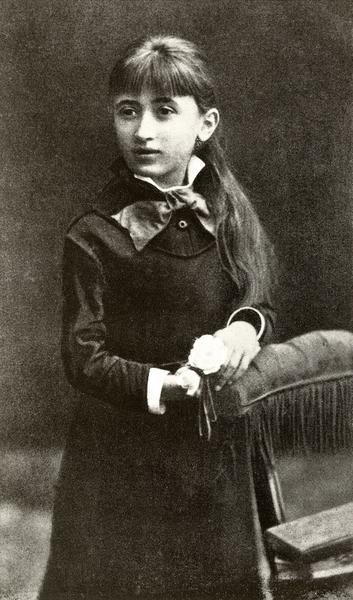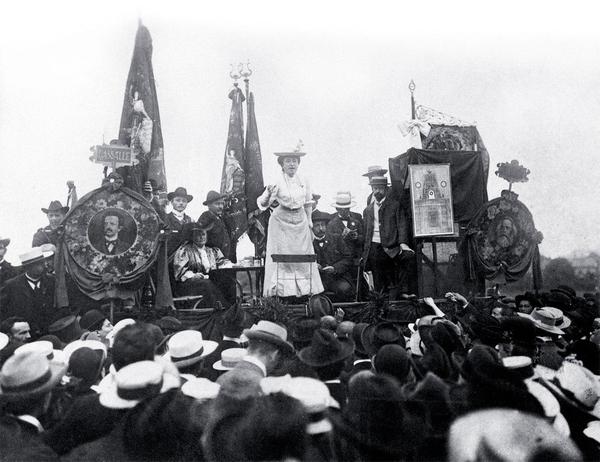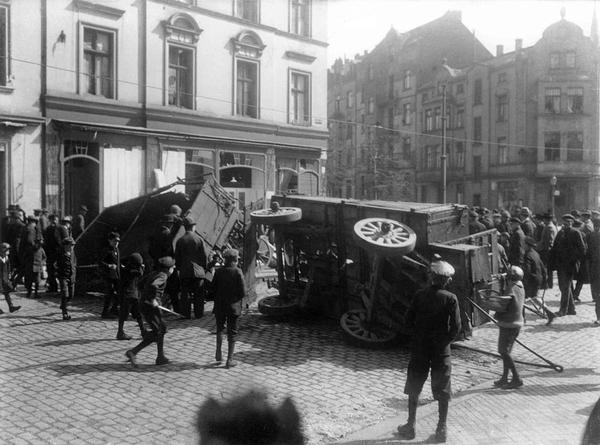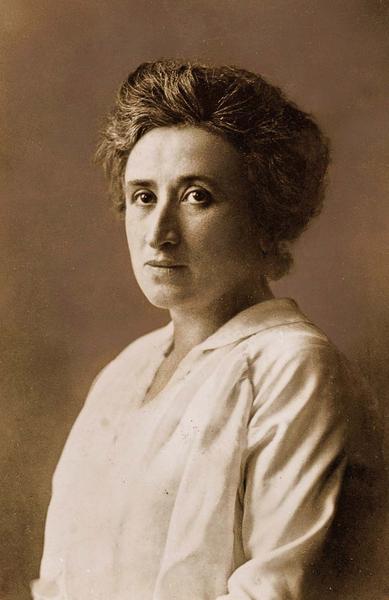April 4, 2025 Hello , Today's feature story is a little long and required more research and writing time than my average newsletter. But I think it's worth it. We're in rough times. We face tough questions. In one of the most regressive periods in modern political history, where is the leadership we need to persevere? Who's
inspiring us to find the time, energy and commitment when we don't know if we'll succeed? We can look back to the early 20th century when Eastern Europe bubbled and boiled like a cauldron. Empires crumbled, nationalism surged, workers revolted, and ethnic groups fought for
autonomy as dictatorship and democracy clashed. Amid this chaos, Rosa Luxemburg envisioned a radical alternative. She challenged both the right and the left, writing
powerful articles, books, and pamphlets. Her activism led to multiple arrests, yet she remained undeterred. Though those in power brutally silenced her, but her words
and example endure. Maybe in this century we're ready to hear what she had to say. Rosa Luxemburg is regarded as one of the greatest theoretical minds and activists of
the European socialist movement. She was among the first women in the world to earn a doctorate in political economics. Her dissertation: stock exchange crises.
The Kind of Leadership We Need
Rosa Luxemburg grew up the the youngest of five siblings in a family of Polish Jews in the city of Zamość, which was occupied by Russia. Her father was a timber merchant and her mother educated and passionate about German and Polish classical literature. At age three, Rosa
suffered disease in one hip, which was mistakenly treated as tuberculosis. Bedridden for a year, she taught herself to read and write. But never recovered fully, walk with a limp for the rest of her life.
By unknown - National Library of Israel, Schwadron
collection, CC BY 3.0,
Students were required to speak Russian at school, but Rosa gathered secretly with other students to illegally study the works of Polish poets and writers. At age fifteen, she joined the Proletariat, the first socialist organization founded in Poland and organizing various political events, including a general strike. After these efforts the Russian authorities dissolved the party and
executed four of its leaders. Troubled by injustice and human suffering, Rosa continued her activism underground until she had to flee for her life and hide in the Polish countryside. She once explained, "I want to burden the conscience of the affluent with all the suffering and all the hidden, bitter tears." Still a teenager, and wanted by the tsarist police, she fled to Switzerland where she attended the University of Zurich, studying philosophy, history, politics, economics, and mathematics. Rosa finished her dissertation in 1889 and moved to Berlin where the Social Democratic Party of Germany (SPD) had grown into the largest of the world’s social and labor parties. Social revolution was afoot and she wanted to be at the center of it. It's dizzying to trace Rosa's activism over the following decades. First, I had to get my revolutions straight, the Russian Revolution of 1905, the Russian Bolshevik Revolution of 1917 and the German Revolution of 1919. Rosa was there for them all and everything in between, often ending up in jail for her ideas and activism. A brilliant thinker, Rosa tested her theories during the 1905 Russian Revolution. She returned to Poland as
protest erupted against Tsar Nicholas II and the autocracy, including worker strikes, peasant revolts, and military mutinies. In Warsaw, her ideas and activism got her imprisoned. But the revolution forced the Tsar to establish a constitutional monarchy and the first Russian Constitution. This convinced her, "Only direct mass action can bring about
change!"
Released from prison, she returned to Berlin and taught at the Social Democratic Party school. Over the years she would work closely with Leon Trotsky. The two didn't always agree, but got along well. "She was a little woman, frail, and even sickly looking," Trotsky noted, "but with a noble face, and beautiful eyes that radiated intelligence; she captivated one by the sheer courage of her
mind and character. "Her style, which was at once precise, intense and merciless, will always be the mirror of her heroic spirit. Hers was a many-sided nature, rich in subtle shadings. Revolution and its passions, man and art, nature, birds and growing things - all these could play on the many strings of her soul."
Rosa Luxemburg addressing a crowd on a platform with banners and images of Lasalle and Marx
during the International Socialist Congress, Stuttgart 1907, Herbert Hoffmann.
At age 25, already a leader and an accomplished writer, Rosa spoke at the International Socialist Congress. Few on the podium were more committed to the idea of International socialism. She was Jewish, Polish, and German, but
her one and only "motherland" was the Socialist International.
Bertram David Wolfe, an American scholar, described Rosa's impact on people. “She walked with an ungainly limp. But when she spoke, what people saw were large, expressive eyes glowing with compassion, sparkling with
laughter, burning with combativeness, flashing with irony and scorn.” Marxism inspired Rosa Luxemburg's thinking, but she was not afraid to critiqued it. While Marxism deemed the collapse of capitalism inevitable, she argued history was full of unpredictable possibilities. She believed
capitalism is fundamentally unstable and tends toward crisis, but argued a just society depends on human choice, awareness, and action. She took issue with Vladimir
Lenin’s idea of national self-determination, believing that . nationalism divided workers and justified wars that hurt the working class. Humanity faced a stark
choice, she said, between socialism and barbarism. By the latter she meant the cruelty of capitalism resulting from economic power held by monopoly holders, corporations, and banks. In her book The Accumulation of Capital (1913), she explored how capitalism, nationalism, militarism, and imperialism are all connected. She criticized Germany’s genocide against indigenous peoples of southwest Africa. Earlier writings she supported their revolt against the German colonials in Malawi, the Congo, and South Africa.
Machinery for working a diamond mine in the rich deposits near Muansa in the German colony of East Africa. (Sueddeutsche Zeitung Photo / Alamy Stock Photo) The
Accumulation of Capital featured about seventy-five pages on Africa, Rosa clearly wanting Eastern European workers to understand and to extend solidarity to the victims of German colonialism. With the outbreak of WWI in 1914, Rosa feared progress for the common people would be halted. She was outraged when The Social Democratic Party she had helped build and strengthen supported the war. it devastated her and Rosa contemplated suicide. Instead, she and colleague Karl Liebknecht broke from the SPD and co-founded the anti-war Spartacus League. Rosa organized anti-war demonstrations, called for conscientious
objection to military conscription and tried to persuade soldiers to refuse to follow orders as had happened in the Russian Army in 1905. Her activism was deemed "inciting to disobedience against the authorities' law and order" and in 1916, she was sent to prison. In her jail cell, in poor health, Rosa Luxemburg wrote the book prescient of Stalinist Russia and perhaps Trump's America. The Russian Revolution predicted the Soviet Union would fail because, citing it's nationalism and the missed political responsibilities of social democracy. Significantly, Rosa criticized the Bolsheviks restriction of democratic freedoms, like press and assembly, warning this could turn a revolutionary regime into "barbarism."
She argued that true socialism required democratic participation and the self-emancipation of
the working class, famously stating: "Freedom only for the supporters of one party is no freedom at all," emphasizing the importance of freedom for dissenting voices." In the final days of World War I, came the German Revolution 1918-1919. An uprising started by workers and soldiers quickly and almost bloodlessly brought down the German Empire. Rosa was released from prison.
Spartacists erecting street barriers at Ellerstraße in Düsseldorf, Germany, 14 April 1919, (Julius Söhn, Rheinische Post) A second and more violent stage of the German revolution followed shortly, pitted supporters of a parliamentary republic against those who wanted a Soviet-style council republic. On January 1, 1919, Rosa and her colleague Karl Liebknecht founded the Communist Party of Germany. The new party engaged in the de facto parliament of Germany, the National Assembly and Rosa urged they vote in the elections to a National Assembly which would constitute the Weimar Republic. But she was overruled. Despite her disagreement and poor health, she joined protests that turned into the Spartacist uprising, an attempt by industrial workers to
overthrow the new Weimar Republic.
Initially successful, the rebellion caught unprepared Berlin police and government units by surprise. But shortly, the uprising was savagely crushed by the Freikorps, right-wing paramilitary units recruited by the government who would later assist Adolf Hitler's rise
to power.
Rosa and Liebknecht were captured by the right-wing units without an arrest warrant and summarily executed them.
Rosa Luxemburg Just before midnight, January 15, 1919, Rosa was beaten unconscious with a rifle butt, punched in the face, shot execution style by Freikorps
officers. The men tossed her body in a canal. Are Rosa Luxemburg's ideas relevant to us today? Her thought combined a critical understanding of Marxism, an emphasis on human agency and political will, a rejection of both determinism and blind progress, and a deep
commitment to anti-imperialism and democracy. She believed the mass strike was revolutionary method of resistance, key to working class power, and necessarily experimental. She rejected the common idea that socialism could be fully defined by the reforms and programs
of party leaders, as workers' interests are not always aligned with even the most active political parties or movements. When Nazi students pillaged university libraries in 1933, searching for books they considered "un-German," they found Rosa Luxemburg's books. And tossed them all in the flame. Rosa's advice to us? “Make no excuses and fight to change the world," she wrote. "History will do its work, see that you, too, do your work.” Like my article today? Forward this email to share with family and friends.
Sources https://jwa.org/encyclopedia/article/luxemburg-rosa
Coming up! May 1st, National Day of Action. May 1st is International Workers' Day, and unions like the United Auto Workers,
Chicago Teachers Union, and the National Education Association, alongside powerful immigration organizations like Mijente are calling us to join them in a National Day of Action. For example, in North Carolina, teachers, parents, students and community allies plan to hold actions in every Congressional district in the state. They'll gather together to center a vision for a healthy, multiracial working class-led democracy in contrast to the racially divisive,
pro-billionaire agenda of the Trump administration AND the political leadership of our state’s General Assembly. Stay tuned for news about how you can get involved!
Follow me on social media
This newsletter is a reader-supported publication. To support my work, consider becoming a paid subscriber.
Read
a great book? Have a burning question? Let me know. If you know someone who might enjoy my newsletter or books, please forward this e-mail. I will never spam you or sell your email address, you can unsubscribe anytime at the link below. To find out more about my books, how I help students, teachers, librarians and writers visit my website at www.MaryCronkFarrell.com. Contact me at MaryCronkFarrell@gmail.com. Click here to subscribe to this newsletter. |
|
|







